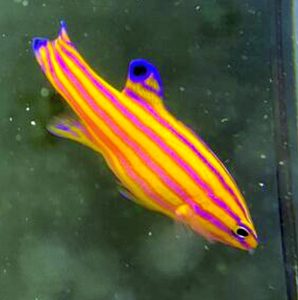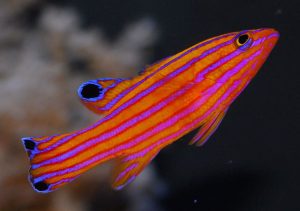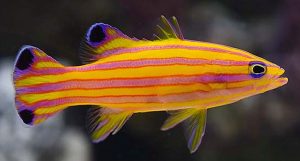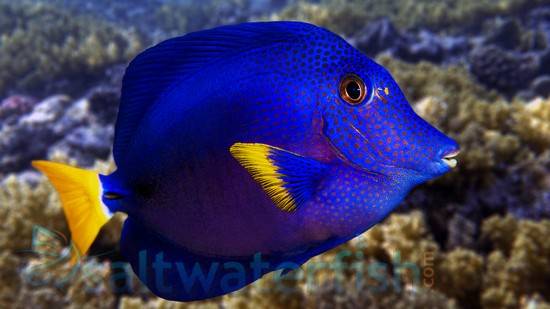The Candy Basslet (Liopropoma carmabi) known to tropical fish keeping enthusiasts as the Candy Cane Basslet is found in the western Atlantic and ranges from the Bahamas and Florida Keys in the U.S.A., along the eastern Caribbean all the way down to some of the smaller islands (Curacao, Bonaire, and Ascension) off the northern coast of South America.
The Candy Basslet is a solitary species that lives in the caves, crevices, and overhangs found on the outer walls of the deeper coral reefs or their range at depths from 50 to over 230 feet where they feed on small fish, small invertebrates, and crustaceans. Most of the specimens collected for tropical fish keeping enthusiasts are found around the 80 depths.
Candy Basslets are very territorial and seldom stray far from their home rock, cave, or ledge; only venturing out to defend their territory or to search for food.
The Candy Basslet has a torpedo shaped body with a pointed head with a relatively large mouth. Although individuals vary in color and intensity, they generally have an orange body color with five intensely bright lavender and red alternating horizontal lines running from the anterior through the pectoral, ventral, and caudal fins. They have a large black spot outlined in deep lavender blue on the upper rear of the dorsal fin, and two black spots on the upper and lower caudal fin joined by a black bar outlined in deep lavender blue.
The Candy Basslet (Liopropoma carmabi) is similar in size and coloration to the Swissguard Basslet (Liopropoma rubre) and Swales Basslet (Liopropoma swalisi) but is easily differentiated by its more intensely colored body.
The Candy Basslet is best housed in a mature FOWLR or reef aquarium of at least 20 gallon capacity, with a fine crushed coral or sandy substrate and plenty of aged live rock arranged into caves, crevices, and overhangs. The Candy Basslet is reef safe and compatible with most fish and invertebrates that are too large to be consumed. They will eat any shrimp or crab that is small enough to fit into their mouth. Because it is found in the deeper waters of the Caribbean, it needs subdued lighting or several areas in the tank with lower light levels where it can shelter from bright lighting.
The Candy Basslet is friendly and peaceful with tank mates close to it’s size, but it can be highly aggressive with their own species. That said, only one pair or one individual per tank is recommended unless you budget accommodates purchasing a 135 gallon or larger reef aquarium. Although they mix well other small reef basslets like the Ridgeback Basslet, Grammas, Anthias, Tangs, and most small Angelfish; keeping the Candy Basslet with any Pseudochromids or wrasses, especially in a smaller reef aquarium is highly discouraged.
Because of their small size and reclusive personalities, this is one species that is best viewed in smaller nano type system. They will literally lose themselves in a large 125 gallon aquarium.
Although mated Candy Basslets have spawned in an aquarium environment, their larvae have not been successfully raised to adulthood. There is some evidence that they are protogynous hermaphrodites.
In their natural deep water environment, Candy Basslets feed mainly on crustaceans and tiny fish. In an aquarium environment, they will accept a variety of fresh or frozen meaty seafoods such as Mysis shrimp, shredded Krill, silver sides, vitamin enriched brine shrimp, squid, and clam. Over time they will accept carnivore and Spirulina based flakes and pellets but a fresh carnivore diet is recommended.
Arguably the most beautiful and brightly colored of all the coral reef fish, the Candy Basslet (Liopropoma carmabi) is rarely available to tropical fish keeping enthusiasts. Online specialty fish shops, wholesalers, and collectors will occasionally offer them for sale on a waiting list basis. Prices vary from $799.98 – $1099.00 and up for a single specimen; to $1,699.99 for a “mated” pair collected in Curacao.
Minimum Tank Size: 20 gallons
Aquarium Type: Reef or FOLR
Care Level: Moderate
Temperament: Peaceful
Aquarium Hardiness: Hardy
Water Conditions: 68-74 °F, dKH 8 – 12°, pH 8.1 – 8.2, sg 1.023-1.025
Max size: Males 2.5″, Females 1.75″
Color Form: Orange, Lavender, Red, Black, Blue
Diet: Carnivore
Compatibility: Excellent Reef
Origin: Western Atlantic
Family: Serranidae
Lifespan: 4 years
Aquarist Experience Level: Advanced





